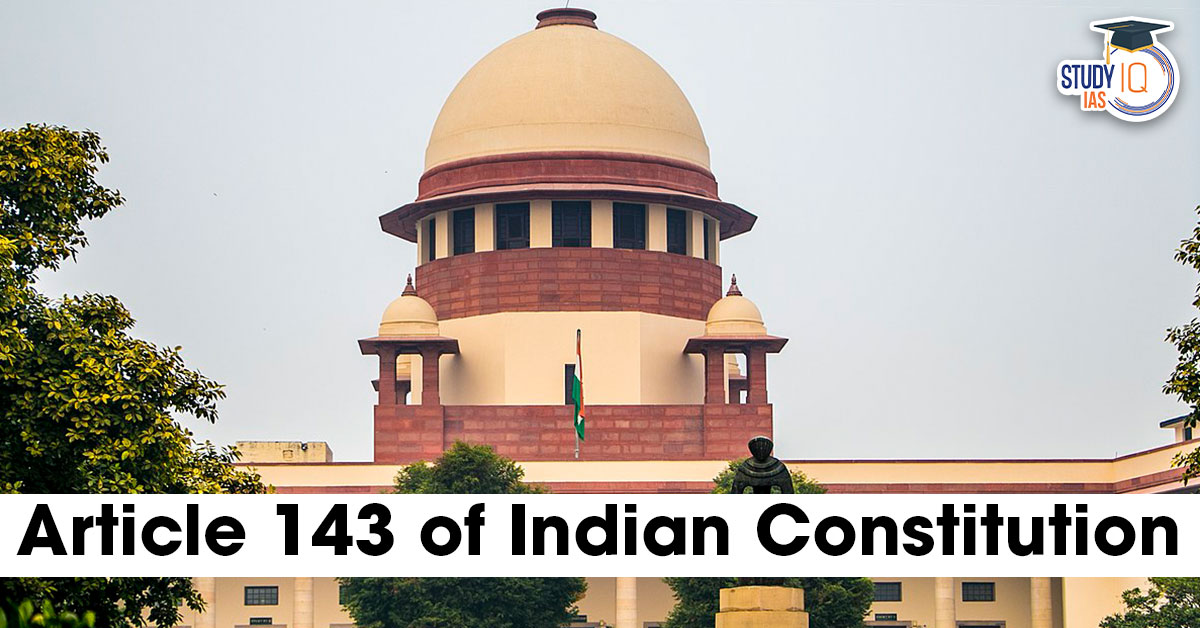Table of Contents
Context: President Droupadi Murmu has sought the Supreme Court’s opinion under Article 143(1) of the Constitution regarding the timelines and judicial review of her assent to Bills sent by state Governors.
Article 143 of Indian Constitution
Article 143 of the Indian Constitution empowers the President of India to seek the opinion of the Supreme Court on important legal or constitutional matters.
President Murmu Used to Seek Clarity from Supreme Court on its Powers under Article 143
President Droupadi Murmu has referred to Article 143(1) of the Constitution, requesting the Supreme Court’s advisory opinion on certain questions of law of great importance.
Context: Supreme Court’s Decision on Governor’s Assent
This reference follows the Supreme Court‘s decision on April 8, 2025, in the case of the State of Tamil Nadu vs. Governor of Tamil Nadu. In this ruling, the Supreme Court established timelines for Governors (and the President) to sign bills passed by state legislatures.
The court had ruled ten bills of the states to have been “deemed assented” for lack of action by the Governors and set timelines: three months for Governors (and the President) to sign pending bills, and one month if a bill is again passed by the Assembly.
President’s Concerns
The President’s reference reflects concerns regarding this decision and asks for clarification regarding whether the Supreme Court can impose such timelines upon the President and Governors unless there are timelines prescribed in the Constitution (precisely Articles 200 and 201).
President Murmu Asked 14 Questions to the Supreme Court
President Droupadi Murmu has sent a 14-point questionnaire to the Supreme Court under Article 143(1) of the Indian Constitution. The questions are based on the recent Supreme Court ruling on timelines for Governors and the President to respond to bills that pass through state legislatures.
- Can the Supreme Court set a timeline for Governors to act on bills under Article 200 of the Constitution?
- Can the Supreme Court set a timeline for the President to act on bills reserved for presidential assent under Article 201?
- Is the concept of “deemed assent” for the President and Governors consistent with the constitutional scheme?
- Does the concept of “deemed assent” fundamentally circumscribe the powers of the President and Governors?
- What are the constitutional options available to a Governor when a bill is presented under Article 200?
- Is the Governor bound by the aid and advice of the Council of Ministers while exercising all options under Article 200?
- Are the Governor’s discretionary powers under Article 200 justiciable?
- Is the President required to seek the Supreme Court’s advice under Article 143 when a Governor reserves a bill for the President’s assent?
- What is the scope and extent of the Supreme Court’s power to issue directions to constitutional authorities like the President and Governors?
- Does the Supreme Court’s power to issue directions extend to matters of executive discretion explicitly granted by the Constitution?
- How does the Supreme Court’s ruling on timelines align with the principle of separation of powers?
- What are the implications of the “deemed assent” ruling for the federal structure of India?
- Are there any inherent limitations on the Supreme Court’s power to prescribe timelines for constitutional authorities?
- What are the broader constitutional principles that should guide the interpretation of Articles 200 and 201?
Types of Reference under Article 143
Article 143(1) – Advisory Opinion on Questions of Law or Fact
- The President may refer any question of law or fact of public importance to the Supreme Court.
- The Supreme Court may give its opinion after hearing the matter.
- The opinion is advisory only (not binding on the President).
Article 143(2) – Matters Related to Pre-Constitution Treaties or Agreements
- If a dispute arises that is excluded from the Court’s jurisdiction due to provisions of the Constitution (like Article 131), the President can refer it.
- In such cases, the Supreme Court must give its opinion.
| Notable Cases Under Article 143 |
|


 Electoral System in India 2026: SIR Upda...
Electoral System in India 2026: SIR Upda...
 SLAPP Suits: Meaning, Examples, Impact o...
SLAPP Suits: Meaning, Examples, Impact o...
 Finance Commission of India, Articles an...
Finance Commission of India, Articles an...

























